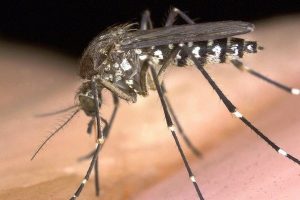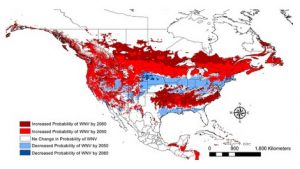West Nile virus is a mosquito-transmitted disease. Most people infected with the West Nile virus rarely develop any signs or symptoms. However, in some cases, this virus can create life threating illnesses such as brain or spinal cord damage. Mild symptoms tend to go away; however, severe symptoms such as sudden weaknesses or severe headaches require immediate attention.[1] The West Nile Virus occurs during mosquito season which is typical during the summer and early fall. Many people in the United States have been affected by the West Nile virus, yet there are no vaccines to prevent or medication to treat this disease. Studies have shown that 1 out of 5 people who are infected develop fever and other symptoms. However, 1 out of 150 infected people develops a serious illness. About 1 out of 10 people who develop severe illness affecting the central nervous system die.[2] If you are infected with this disease there is an extremely small chance that you will experience symptoms. If you are older and have certain diseases such as hypertension, cancer, and kidney disease it can increase your risk of getting the West Nile virus.[3] However, recent studies have shown that global warming can contribute to more cases of the West Nile virus.

Mosquito-borne diseases have been on the rise due to global warming. The higher temperatures, humidity, and rainfall linked to climate change have increased outbreaks of the West Nile Virus. A survey has connected the West Nile Virus to warming weather patterns and increasing rainfall. With global warming temperature and rainfall are projected to increase. With the temperature and precipitations being the determinant factor for the West Nile Virus, the changes will increase the disease in the future. According to a study conducted by the Harvard School of Public Health, they have found that the warmer temperatures had the greatest effect on humans contracting the disease. Higher humidity, temperature, and rainfall are all tied up with the increased rate of the West Nile Virus. Warmer weather helps spread the West Nile Virus because it allows the mosquitos to live longer and also increase the length of the mosquito season. Higher temperature also let mosquitos reach biting age sooner which will speed up the spread of the virus. Not only will there be more mosquitos carrying the West Nile Virus but they will also carry more copies of the West Nile virus making them more likely to infect humans. Another study has shown that a single rainstorm of only two inches could increase infection by 33 percent. The increase of rainfall can increase humidity which will stimulate mosquitoes to bite. An increase of 0.75 inches of rainfall raises the number of infections by five percent. With global warming worsening as the years go on it is important to take precaution and always apply repellent when you are heading outdoors.[4]

Due to the fact that there is a rare chance of developing severe symptoms many do not take this virus seriously. As of September 2018, in Greenville County, a resident was confirmed dead due to the West Nile Virus. The Department of Health and Environmental Control has confirmed seven human cases of West Nile in the upstate. At least five areas in South Carolina have reported being affected which include Greenville country, Boiling Springs, Greenwood, and Columbia. [5] It is important as a community to help promote the use of insect repellent and encourage others to wear long-sleeved shirts and long pants when outdoors to prevent the risk of developing the virus. The symptoms of developing a serious illness are very slim but it is always better to be safe than sorry.
-Tiffany Mendez

[1] “West Nile Virus,” Mayo Clinic, January 03, 2018,
[2]“West Nile Virus,” Centers for Disease Control and Prevention, August 02, 2017
[3] West Nile Virus,” Mayo Clinic, January 03, 2018,
[4] Gammon, “Global Warming May Lead to More West Nile Virus,” Scientific American, March 20, 2009
[5] Emily Bohatch, “SC Sees First West Nile Virus Death in 2018,” Thestate.com
References:
Bohatch, Emily. “SC Sees First West Nile Virus Death in 2018.” Thestate. Accessed September 28, 2018. https://www.thestate.com/news/state/south-carolina/article218185280.html.
Gammon. “Global Warming May Lead to More West Nile Virus.” Scientific American. March 20, 2009. Accessed September 28, 2018. https://www.scientificamerican.com/article/west-nile-virus-global-warming/.
“West Nile Virus.” Centers for Disease Control and Prevention. August 02, 2017. Accessed September 28, 2018. https://www.cdc.gov/westnile/symptoms/index.html.
“West Nile Virus.” Mayo Clinic. January 03, 2018. Accessed September 28, 2018. https://www.mayoclinic.org/diseases-conditions/west-nile-virus/symptoms-causes/syc-20350320.
Pictures:https://www.nj.com/news/index.ssf/2018/08/officials_confirm_first_human_case_of_west_nile_vi.html
https://grist.org/climate-energy/wanna-get-west-nile-virus-climate-change-will-help/